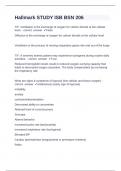-
1. Exam (elaborations) - 206 final bsn 206 nightingale college questions with complete solution
-
2. Exam (elaborations) - 206 final exam review bsn 206 nightingale college question and answers rated a+
-
3. Exam (elaborations) - 206 final bsn 206 nightingale college question and answers already passed
-
4. Exam (elaborations) - 206 study cards bsn 206 nightingale college question and answers 100% correct
-
5. Exam (elaborations) - Bsn 205 wound care isb bsn 206 nightingale college question and answers correctly sol...
-
6. Exam (elaborations) - Bsn 206 sherpath week 1 bsn 206 nightingale college questions with complete solution
-
7. Exam (elaborations) - Exam 1 nursing 206 bsn 206 nightingale college question and answers already passed
-
8. Exam (elaborations) - Hallmark final exam bsn bsn 206 nightingale college question and answers already pass...
-
9. Exam (elaborations) - Hallmark study isb bsn 206 bsn 206 nightingale college question and answers correctly...
-
10. Exam (elaborations) - Module 2 bsn 206 nightingale college question and answers rated a+
-
11. Exam (elaborations) - N206 exam 1 bsn 206 nightingale college question and answers 100% correct
-
12. Exam (elaborations) - Nrs 206 exam bsn 206 nightingale college question and answers already passed
-
13. Exam (elaborations) - Nrsi 206 bsn 206 nightingale college question and answers verified to pass
-
14. Exam (elaborations) - Nu 206 final exam bsn 206 nightingale college question and answers correctly solved
-
15. Exam (elaborations) - Nu 206 final study guide bsn 206 nightingale college questions with complete solution...
-
16. Exam (elaborations) - Nur 206 final exam bsn 206 nightingale college question and answers already passed
-
17. Exam (elaborations) - Nur 206 mod 1 bsn 206 nightingale college question and answers already passed
-
18. Exam (elaborations) - Nur 206 u2m3 terms bsn 206 nightingale college question and answers already passed
-
19. Exam (elaborations) - Nur 206 u3m4 bsn 206 nightingale college question and answers verified to pass
-
20. Exam (elaborations) - Nur 206 u3m5 bsn 206 nightingale college question and answers correctly solved
-
21. Exam (elaborations) - Nur 206 bsn 206 nightingale college question and answers 100% correct
-
22. Exam (elaborations) - Nurs 206 exam 1 bsn 206 nightingale college question and answers correctly solved
-
23. Exam (elaborations) - Nurs 206 exam 1 bsn 206 nightingale college question and answers rated a+
-
24. Exam (elaborations) - Nurs 206 midterm bsn 206 nightingale college question and answers 100% correct
-
25. Exam (elaborations) - Nurs 206 quiz 1 bsn 206 nightingale college question and answers already passed
-
26. Exam (elaborations) - Nurs 206 bsn 206 nightingale college question and answers 100% correct
-
27. Exam (elaborations) - Nursing 206 bsn 206 nightingale college question and answers already passed
-
28. Exam (elaborations) - Nursing 206 bsn 206 nightingale college question and answers already passed
-
29. Exam (elaborations) - Nursing 206 abbreviations bsn 206 nightingale college question and answers verified t...
-
30. Exam (elaborations) - Nursing 206 assessment test 3 bsn 206 nightingale college question and answers correc...
-
31. Exam (elaborations) - Nursing 206 bsn 206 nightingale college question and answers correctly solved
-
32. Exam (elaborations) - Nursing 206 exam 1 bsn 206 nightingale college question and answers rated a+
-
33. Exam (elaborations) - Nursing 206 exam 1 bsn 206 nightingale college question and answers 100% correct
-
34. Exam (elaborations) - Nursing 206 exam 2 ch 29 medications bsn 206 nightingale college question and answers...
-
35. Exam (elaborations) - Nursing 206 exam 2 content bsn 206 nightingale college question and answers verified ...
-
36. Exam (elaborations) - Nursing 206 exam 4 bsn 206 nightingale college question and answers correctly solved
-
37. Exam (elaborations) - Nursing 206 nursing process bsn 206 nightingale college questions with complete solut...
-
38. Exam (elaborations) - Nursing 206 test 1 sdsu bsn 206 nightingale college question and answers rated a+
-
39. Exam (elaborations) - Nursing 206 ufv bsn 206 nightingale college question and answers rated a+
-
40. Exam (elaborations) - Nursing 206 bsn 206 nightingale college question and answers 100% correct
-
41. Exam (elaborations) - Nursing 206 bsn 206 nightingale college question and answers already passed
-
42. Exam (elaborations) - Unknown terms to review bsn 206 bsn 206 nightingale college question and answers corr...
-
Show more




